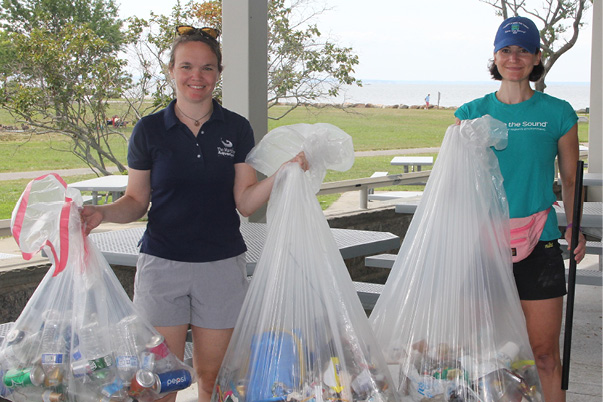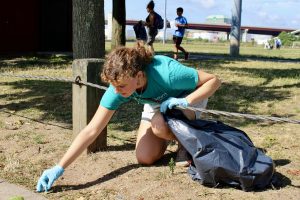By Lindsay Skedgell, Ecological Communications Specialist

Bridget Cevero of The Maritime Aquarium (left) and Annalisa Paltauf of Save the Sound with 35.75 pounds of trash collected by volunteers at a cleanup at Sherwood Island State Park. © Judy Benson/Connecticut Sea Grant
Annalisa Paltauf has been managing the cleanup program for Save the Sound for seven years. An avid trail runner and cyclist, she spends most of her free time outdoors, appreciating what nature has to offer. “Since college, I have had a strong interest in preserving the environment,” says Paltauf. She believes cleanups are important because they provide immediate, tangible benefits and change, while encouraging community involvement and connection.
Trash poses numerous risks, and Save the Sound is committed to eliminating it from the environment across the whole Long Island Sound region. In our streams, marshes, parks, and beaches, large pieces of plastic suffocate marine life while small ones carry toxins that accumulate in the fish that we consume. Cigarette butts, composed mainly of a plastic called cellulose acetate, don’t decompose. When disposed of improperly, they leach harmful chemicals into our ground and water. Plastic bottles break down into smaller pieces, and straws can suffocate birds and sea turtles. Broken glass and plastics can cut swimmers’ feet, and fishing line and rope foul boat engines. All trash poses a severe threat to ecosystem health.
Paltauf is no stranger to the harm that trash causes, and how cleanups help alleviate it. “The environmental benefits are numerous,” she says, “from making sure litter doesn’t enter the water, to preventing discarded fishing lines from entangling wildlife, to removing items that can leach chemicals into the ground and our waterways.”
Save the Sound has been the official Connecticut coordinator for Ocean Conservancy’s International Coastal Cleanup (ICC) for over two decades. Each year, Paltauf works with volunteer Cleanup Captains to help coordinate cleanups at beaches, riverbanks, and parks throughout Connecticut by providing support, supplies, and volunteer recruitment assistance. Cleanups are intergenerational and inclusive, which is one of many reasons Paltauf loves being a part of them. The cleanup program encourages the next generation of environmental stewards and community involvement, all while helping to improve the health of our local waterways.
The annual ICC event has inspired a year-round network of state-wide cleanups. “I love it when someone who volunteered at a cleanup reaches out to me to ask about becoming a Cleanup Captain and organizing their own event,” she says. “It’s encouraging that some of our volunteers have cleanup experiences that inspire them to take their love of the environment to the next level,” such as the high school student who, after volunteering, took initiative to organize two cleanups on their own.
Cleanup volunteers don’t just pick up the trash; they also gather data including types of trash, number of pieces, total weight, and more. This data is used to advocate for policy change, not only in our region, but across the world as part of Ocean Conservancy’s global report. Save the Sound has used its own cleanup data and data from fellow organizations (the Littoral Society is the official ICC sponsor for New York) in recent years to support Connecticut and New York legislation to keep plastic bags, balloons, Styrofoam, and other plastics out of our waters and parks.
In 2023, rainfall had a significant impact on data collected. “We would have had 87 cleanups, but rain nearly every weekend throughout September and October resulted in many cancellations,” Paltauf says. “Some cleanups did take place on the rainy days and volunteer and trash data numbers were significantly less for those events.” Though rain meant less total trash picked up, and fewer items recorded, the patterns we saw were familiar.

© Kimberly Wipfler
Following the trend of many prior years, cigarette butts came in at number one, with 11,645 picked up. Other notable highs included food wrappers at 8,113, small plastic pieces at 5,403, and plastic bottle caps at 4,299. The weirdest things Paltauf has found at cleanups are a moped, a dog bed, Christmas stockings, and a toilet seat.
Save the Sound’s next large-scale event is an Earth Day Cleanup on April 21 at Long Wharf in New Haven, CT. Visit savethesound.org to find out how you can pick up trash and speak with Save the Sound staff. There you’ll also find our full breakdown of 2023 cleanup data and our 2022 Connecticut Cleanup Report, which looks at six years of compiled data. ■



